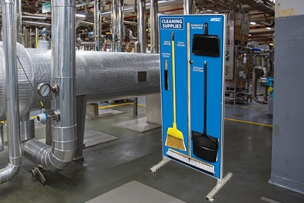In business for over 80 years AccuformNMC is the leading manufacturer of American made safety communication products—including over 16,000 safety signs, tags, and labels. Our commitment is to support every safety ID need, with the best product, service and custom solutions in the industry. We offer the toughest signs and labels in the market, and guarantee them for life. Protected with Sign Muscle®, a clear liquid over-laminate strong enough to protect against fading under direct sunlight, it allows easy graffiti removal, resists chemical corrosion and is applied for free.
As the COVID-19 vaccine becomes more readily available, several new considerations come to light. Will your workplace require vaccinations? Can your workplace require vaccinations? Will you require visitors/contractors to be vaccinated? How will you communicate your workplace requirements? These questions should be posed now.
How Much Latitude do Employers Have?
Employers’ power to mandate inoculations comes from the U.S. Labor Department’s Occupational Safety & Health Administration (OSHA) and the Equal Employment Opportunity Commission (EEOC).
OSHA’s position was spelled out in 2009 during the H1N1 (“swine flu”) outbreak. OSHA said that while it doesn’t require employees to be vaccinated, employers may mandate inoculations.
“It is important to note,” OSHA added, “that employees need to be properly informed of the benefits of vaccinations.”
The EEOC issued its guidance on employee vaccinations on March 21, 2020, during the pandemic’s early days in the U.S. The EEOC restricted its guidance to employers covered by the Americans With Disabilities Act (ADA) and Title VII of the Civil Rights Act – meaning those with 15 or more employees—and concluded that they should “encourage” employees to be vaccinated.
The EEOC noted, however, that under the ADA, an employee can be exempted if they have a disability that prevents them from taking the vaccine, and under Title VII if they can demonstrate a “sincerely held religious belief, practice, or observance.”
While the EEOC noted those possible exemptions, it also said COVID-19 poses a special risk that gives employers greater latitude in what it can require of employees to maintain safe workplaces. The key term is “direct threat,” which means a significant risk that “cannot be eliminated or reduced by reasonable accommodation.”
In other words, COVID-19 poses a “direct threat” that would make it difficult for workers to refuse a vaccination on ADA or Title VII grounds and expect to keep their jobs.
Litigation Concerns
Employers might still be nervous about a discrimination lawsuit if they issue a strict vaccination policy. However, Baruch College law professor Debbie Kaminer wrote that under Title VII, employers are not required to provide accommodation if doing so involves more than minimal cost – and with the presence of COVID-19, they run the risk of far more than minimal cost.
“Certainly,” Kaminer wrote, “in the midst of one of the worst public health and financial crises in recent history, there is a significant cost to having an unimmunized workforce.”
Summing up, employers do have a legal right to require employees to get a COVID-19 vaccination to maintain employment, but exemptions do exist. Employers have legal standing to require vaccinations and it may be wise to begin explaining this reality to employees. Planning starts now, and as always, consult your HR/legal team.
See NMC's full-line of COVID-19 Vaccine Requirement Signs, Labels, Banners and Wristbands or download their NEW Vaccine ID Essentials brochure here.
Previously Featured on National Marker Company's blog.

.png?itok=k2IwFSM2)






Talk to Us!
Leave a reply
Your email address will not be published. Required fields are marked *